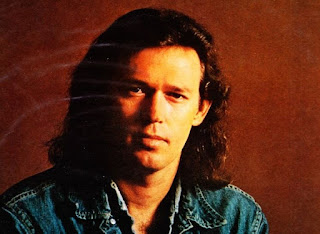John David "Moon" Martin (October 31, 1945 – May 11, 2020) was an American singer-songwriter, guitarist and one of the more curious characters of the new wave movement. Moon Martin issued several critically acclaimed yet commercially underappreciated releases from the late 1970s through the early '80s before reappearing in the mid-'90s.
Born John Martin in Altus, Oklahoma, he played in local bands, including a rockabilly group, the Disciples, while attending the University of Oklahoma. Martin relocated to Los Angeles in the late '60s and paid the rent as a session musician, playing on albums by Del Shannon and Jackie DeShannon. Soon, however, his former Disciples band-mates followed him to the land of surf and sun, changing their name to Southwind whose style shifted towards country rock. They issued a total of three underappreciated country-rock albums on the Blue Thumb label between 1969 and 1973: a self-titled debut, Ready to Ride, and What a Place to Land.
Upon the group's split, Martin returned to session work, contributing to Jesse Ed Davis' Ululu, Linda Ronstadt's Silk Purse, and a few Gram Parsons songs. Martin also began to focus on a solo career at this time, adopting the nickname "Moon" from friends after it became an inside joke because of the songwriter's penchant for mentioning the word in his compositions.
Initial plans to record a solo album in 1974 with noted producer/arranger Jack Nitzsche failed to pan out, but several of Martin's original compositions were used by other recording artists, including the Nitzsche-produced Mink DeVille (the track "Cadillac Walk" subsequently became a moderate hit), as well as Michelle Phillips and Lisa Burns. By 1978, Martin (who by this time was known simply as Moon Martin) was finally ready to launch his solo career, with his look and music often compared to such new wave hitmakers as Elvis Costello and Nick Lowe.
A total of five albums in a five-year span followed, including Shots From A Cold Nightmare (1978), Escape From Domination (1979) which featured the Top 30 hit Rolene and Street Fever (1980) which featured the hit Bad News which reached the Top 10 in France, and Mystery Ticket (1982) all of which were issued on the Capitol label. His Victim Of Romance EP from 1978 included "Bad Case of Lovin' You" which would become a hit when covered by Robert Palmer. Martin also had some minor singles hits in Australia with “Signal For Help”, Aces With You” and “X-Ray Vision” which also became an MTV hit music video in 1982.
He was also featured on guitars and vocals with rock legends Linda Ronstadt, Del Shannon, Glenn Frey, Don Henley and Michelle Phillips among others, while also gaining recognition both in the United States and France as a solo artist and composer. Martin then dropped out of the music scene for the rest of the '80s and the early part of the '90s, before resurfacing in 1995 with a pair of releases, Cement Monkey and Lunar Samples. The same year, the British label Edsel reissued Martin's first four full-length releases as two-for-one CDs (Shots from a Cold Nightmare was paired with Escape from Domination, while Street Fever was combined with Mystery Ticket).
Producer Craig Leon, who had worked with Moon Martin, confirmed that the rocker died on May 11, 2020 of natural causes in Encino, California, at the age of 74. On October 31, 2022, Midnight Moon, a posthumous album, was released, only available on several music streaming services.
(Edited from Wikipedia, AllMusic & LA Times)























.jpg)



























